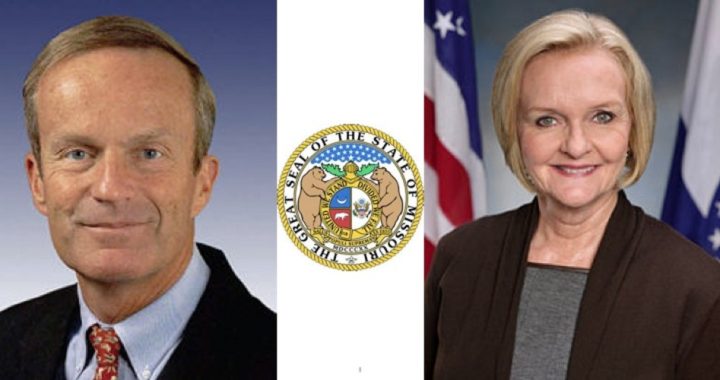
With an ad the opposing camp has denounced as “desperate, nasty campaigning,” Republican Rep. Todd Akin has gone on the offensive against Sen. Claire McCaskill in the closely watched U.S. Senate race in Missouri. Akin has taken to the airwaves with a TV ad that accuses his Democratic opponent of profiting by her vote in favor of the Obama stimulus program in 2009. The ad begins with a narrator asking:
Ever wonder why Claire McCaskill called the stimulus bill “wildly successful”? The stimulus that didn’t create jobs and cost us billions? Well now we know. The stimulus made McCaskill rich. More than one million paid to partnerships owned by McCaskill’s family. When she gives us excuses, just remember this.
Then McCaskill is heard saying: “There was a group of us that went through the bill line by line.”
“Claire McCaskill is getting rich on us, line by line,” the narrator says, followed by Akin identifying himself and announcing his approval of the message. Akin announced on his campaign website that the ad is running statewide.
“Claire McCaskill is on record for going through the stimulus line by line, and stated that the stimulus was solely for creating jobs and stimulating the economy,” Akin said in a message posted with a video of the ad. “Now we know that McCaskill’s family business received $1 million of taxpayer money from the stimulus bill that she voted for. I voted against this bill because I did not believe it would help the economy and because pork-barrel spending can neither stimulate the economy nor create jobs.”
But the McCaskill campaign has cried foul, claiming nothing like $1 million went to the real estate business of McCaskill’s husband and that what the business did receive was not directed there by the senator.
“Todd Akin can’t defend his own extreme record, so he’s resorted to false, misleading attacks against Claire’s family,” said Caitlin Legacki, the McCaskill spokeswoman who called the ad “desperate, nasty campaigning.”
The $1 million in the Akin ad refers to about $1 million of stimulus-funded payments made by the federal Department of Housing and Urban Development to companies with subsidized housing developments in Illinois, Kansas, Missouri and New Mexico in which McCaskill’s husband, Joseph Shepard, had assets, according to reports by the Associated Press and huffingtonpost.com. According to McCaskill’s financial disclosure reports, Shepard’s stakes in the developments were between less than one percent and five percent, and he received between $2,800 and $9,600 in the years since the stimulus bill was enacted. Congress did not direct the money to the companies, but allocated $2 billion of the total $790 billion stimulus spending to a Housing and Urban Development subsidized housing program. HUD distributed the money among more than 6,000 contractors who ran subsidized housing units. The money went to businesses already under contract with the agency and was to pay contractors for what they were owed, according to HUD.
Controversy over her husband’s financial dealings is nothing new to McCaskill. The first-term Democrat faced similar charges in a campaign for governor in 2004 and in her successful Senate campaign in 2006. In the 2004 gubernatorial primary, Democratic Gov. Bob Holden ran an ad accusing Shepard of running dangerous nursing homes that helped finance McCaskill’s campaign. In the 2006 Senate race, Republican Sen. Jim Talent accused Shepard and McCaskill of using an insurance company based in the Bahamas as a tax shelter, a charge they denied.
The documentary support for the Akin ad was originally intended for one of Akin’s opponents in the Senate primary, huffingtonpost.com reported and the substance of it was originally posted on American Crossroads, a political action group affiliated with Karl Rove, an influential Republican strategist and former political advisor to President George W. Bush. The ad may be a sign that Republicans are beginning to rally around Akin again. The six-term congressman was regarded as the favorite in the race until his comments about “legitimate rape,” made in a TV interview shortly after he won the three-way primary, saw his polling numbers drop as virtually the entire Republican establishment disavowed his candidacy, withdrew financial support, and called upon Akin to drop out and let Missouri Republicans select another candidate.
Akin ignored their demands and since the September 25 deadline for replacing a candidate passed there have been signs of party support returning to the race, considered key to Republican hopes of recapturing control of the Senate. Last week the National Republican Senatorial Committee announced its support of Akin, though the committee did not say if it would be backing the endorsement with funding.
Polls on the race have fluctuated in recent weeks with different surveys showing McCaskill leads ranging from one to 10 percent. Republicans, who hold a majority of the seats in the House of Representatives, need a net gain of four in this year’s Senate races to gain control of the upper chamber — or three if they also win the White House, in which case Paul Ryan, as vice president and president of the Senate, would be able to cast tie-breaking votes.
The rules of the Senate, however, allow a minority of senators to block legislation, and a three-fifths majority, or 60 votes, is needed to stop a filibuster. No one expects Republican to gain anywhere near 60 seats, so even if Mitt Romney is in the White House with Republicans in the majority in each house of Congress, Romney’s pledge to repeal ObamaCare could be stymied by a Democratic filibuster.
Photos of Rep. Akin and Sen McCaskill from their congressional websites.



